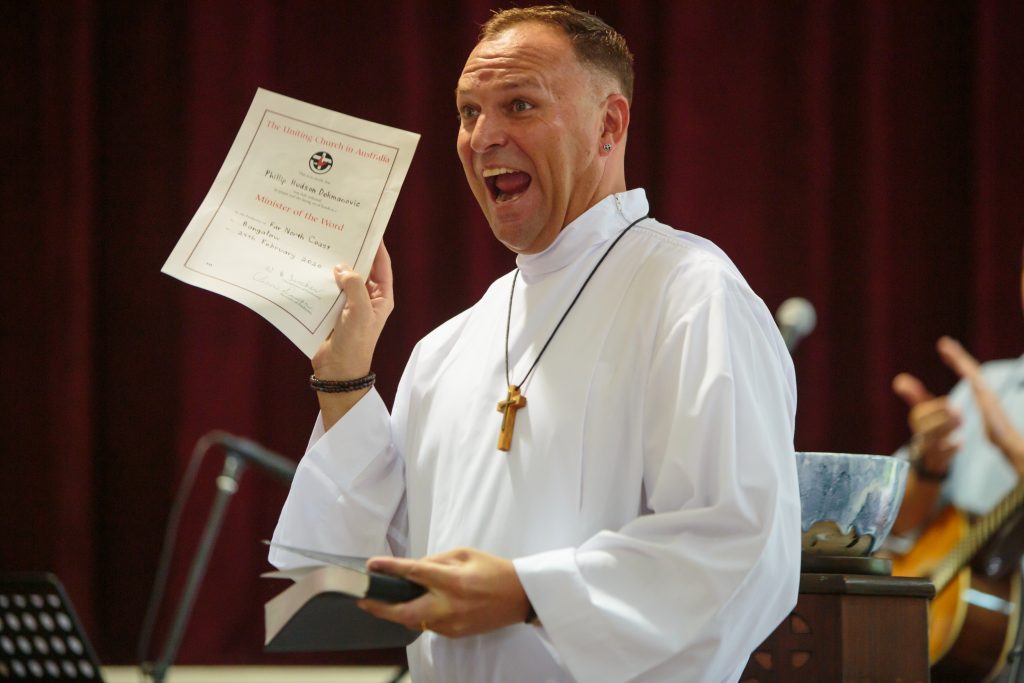
Sally Schofield chatted with Uniting Church minister Rev. Phil Dokmanovic about music and ministering.
When I think of most organised religion, I think of an ‘us’ and ‘them’ ideology embedded in lessons delivered from on high, down to the design of the building, and through to the natural conclusion, a fear of God. Separation. Judgement. Worse.
Phil doesn’t subscribe to that brand of Christianity. Born and raised in Sydney’s Western suburbs, he grew up in a Christian household, attending a Christian school from kindy to year 12, and connecting his love of music with his faith. Teaching was his goal, maths in particular, which shares many patterns and logic with his other passion, music. “Music was something I picked up in high school when I was about 15. I had a wonderful school music teacher who said, ‘Oh, you’d be a great trumpet player,’ but I wanted to play cricket for Australia,” he laughs.
As is often the case with young people, encouragement from an inspirational source can have a profound and lasting impact. “This teacher started a band, and all my friends were in it. I thought, ‘Oh, I’m missing out.’ They were all on a band tour, and I was in a classroom, so I said, ‘OK. Give me the trumpet.’”
While music was a great outlet for teenaged Phil, he didn’t aspire to become a musician; instead, he had his heart set on going to university to become a maths teacher. His first few years on the job were at some of the toughest schools in Sydney’s Western Suburbs, which in many ways highlighted the disparity and disadvantage in society that would eventually lead Phil on a transformative pathway from teacher to pastor to minister.
Meanwhile, Phil progressed from playing the trumpet to the cornet. I’m a bit rusty on my brass, so he reminds me to “think of it like a squashed trumpet but with a sweeter sound.” The instrument was adopted by jazz musicians such as Louis Armstrong and became a staple sound of the classic British ‘coalminers’ brass band. Phil fine-tuned his playing while continuing his studies in maths and education and went on to play the cornet in a national championship.
A lecturer from the University of Salford in Manchester was there to adjudicate, and upon hearing Phil play, offered him a scholarship to study with him. “That was a radical turnaround because I had been thinking I’d be a teacher!” After a long stint in Manchester playing cornet, Phil returned to education, becoming a music teacher and teaching for 12 years in Australia.
Phil credits his mum as being “really foundational” in the role faith plays in his life. “From a young age, I had this sense of being committed to this faith thing; it was never forced on me by my parents, but it was just encouraged to go along and be part of it.” So, when church services—and music in particular—began to modernise, Phil saw an opportunity to get even more involved, leading music groups within the church. At the same time, a renewed understanding of the narratives contained in the scriptures, sparked by a conversation with a visiting Canadian colleague, got Phil thinking.
“Oh, there’s more to learn,” he laughs. “So, I did an online course that was based around music and theology and loved that. It was very practical; I wrote a few songs, and when that was done, I enrolled in a Bible college part-time while I continued to teach part-time, still not thinking that this was a journey to become a minister.”
Even after completing a Master of Divinity, Phil had still not heard angels with trumpets heralding ministry as his vocation but edged closer to this inevitability by stepping into a role as a music minister in a church on the Central Coast. During this time, his down-to-earth demeanour and approachability were recognised by his peers who gently shepherded Phil onto the path to becoming a Reverend. He commenced a Year of Discernment (a trial 12 months to determine your suitability and commitment to the work). “After that, it became more and more clear to me that this calling was for me.”

The year 2020 was a difficult one for many, and Rev. Phil was no exception. COVID aside, he weathered several challenging personal crises but also enjoyed the culmination of years of study and commitment to his faith when he was ordained as a Uniting Church minister in a ceremony at the majestic Bangalow A&I Hall.
Phil is aware of the waning influence of organised religion in our increasingly secular society and is working with others in the community to contemporise the experience of faith. “I do feel like the Uniting Church is unique in their progressive nature. They are passionate about the issues that resonate with people in this region, whether it be Indigenous or identity, sexuality, fair trade, or climate change.” This former Bangalow cricket club player seeks to level the playing field and make faith more accessible and relevant, joking that he would remove the elevated pulpit from his own church if not for its heritage status. “I’ve never been up there. I prefer to be with the community.”